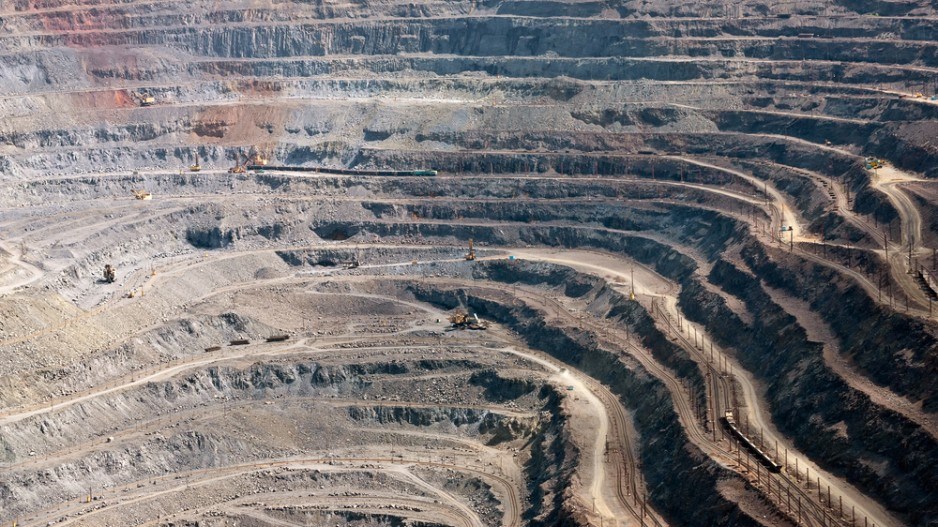A short history of Taseko Mines' (TSX:TKO) embattled New Prosperity copper-gold project paints a convoluted picture – provincial approval, federal rejection, sweeping design changes and, still to come, a federal judicial review spurred by Taseko's contention that a review panel used incorrect data when assessing the project.
But amidst an ever-growing list of twists and turns, the message delivered at a British Columbia Chamber of Commerce event December 10 was simple: New Prosperity is a project that must be developed.
"Our reason for being here today is to demonstrate that the B.C. business community is firmly behind the need to approve this project and the significant economic benefits New Prosperity will bring to the region and the province," said John Winter, president and chief executive officer of the BC Chamber of Commerce.
Joining Winter in support of New Prosperity – a deposit located southwest of Williams Lake – were representatives from the political and business communities from across the province.
Williams Lake mayor Kerry Cook said the development of New Prosperity is critical for the economic future of her city and the Cariboo region as a whole. The mine is an opportunity to create new jobs and ease the area's dependency on an unstable forestry industry.
"Williams Lake, like Quesnel and our region, needs to realize greater economic diversification so that we can minimize the impacts to employment and our citizens from any single industry shut down," said Cook.
"As a local government we have a duty to consider economic opportunities that are put before us. The New Prosperity project presents an opportunity to diversify and strengthen the economic base of Williams Lake and the region."
Bill Bennett, Minister of Energy and Mines, echoed both Winter and Cook, saying he sees "every day what mining does for a community and what it does for a province."
"I am absolutely convinced that New Prosperity can be built in a way that we can all be proud of," said Bennett, adding he will be meeting with various federal ministers in the next few days to promote the project.
"I am here to tell you that the Province of British Columbia wants to see the project proceed as long as it can get approval from the federal government."
New Prosperity, however, hasn't had any luck in the obtaining-federal-approval department. In 2010, Ottawa rejected the project, then known as Prosperity, because Taseko claimed it had to drain nearby Fish Lake in order to build a tailings pond. B.C. approved the project at the time because of its economic benefits.
After that rejection, Taseko re-designed the mine and moved the tailings pond two-kilometres upstream, saving Fish Lake. Taseko claimed the move added $300 million to the cost of the project, pushing the price tag north of $1 billion.
But in a 323-page report released November 1, a three-person federal review panel concluded that development of the mine still would result in "several significant adverse environmental effects."
The primary concern cited in the report is New Prosperity's impact on the water quality in Fish Lake. Even though the tailings pond has been moved, the panel believes an unacceptable amount of tailings would seep eventually into the lake.
The Tsilqot'in National Government (TNG), a council representing five First Nations communities on whose traditional land the project is proposed, has long fought the project because of the environmental damage it would allegedly cause.
In a phone interview, Joe Alphonse, Tribal Chair of the TNG, called today's press conference a "last hurrah" by a desperate industry. If the mine was such a good idea it would have been built by now, he said.
"It doesn't surprise me that these people are going to any length to try and get an approval," said Alphonse.
"But the truth is they are just lying on their death beds with it."
Ervin Charleyboy, a former chief of the Alexis Creek First Nation and member of the TNG who spoke at the chamber event, said not all Tsilqot'in people are opposed to New Prosperity but many are scared to speak in favour of the project for fear of being ostracized from the community.
His support of New Prosperity has resulted in personal attacks from leaders in the Tsilqot'in community, he said.
"I talked to a lot of young people out there and they are all for the mine but they are scared to speak out because they will be intimidated like they tried to do with me," said Charleyboy.
"But I'm not easily intimidated, I've been there for 20 years."
Alphonse scoffed at Charleyboy's claims, calling it nothing more than a "convenient" story in room where no one could say otherwise.
"That's a laughable argument," said Alphonse.
"He just knows there are no Tsilqot'ins in the room to counter him."
New Prosperity is considered the country's largest undeveloped copper-gold project with an estimated 5.3 billion pounds of copper and 13.3 million ounces of gold.
The Canadian Environmental Assessment Agency is currently reviewing the panel's report, which was published October 31. It has 120 days from publication of the report to make a decision on the fate of New Prosperity.




